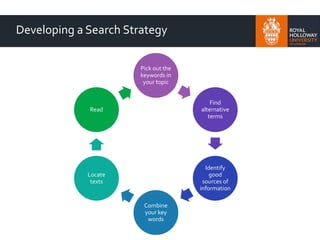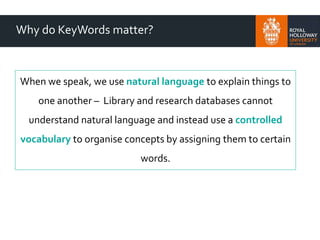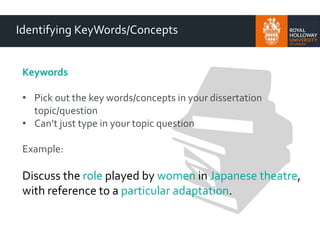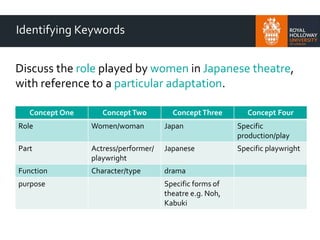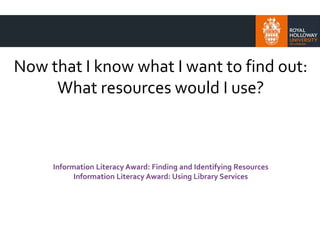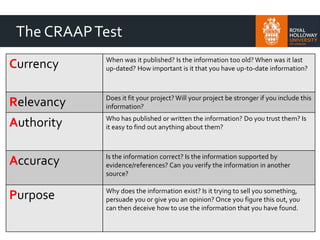Information Literacy Award - Drama, Theatre & Dance
- 1. Information LiteracyAward Drama,Theatre & Dance Libguides.rhul.ac.uk/Drama RachelWhite
- 2. Outline • Information Literacy Award • Developing a search strategy • Searching tips & tricks • Citation & Referencing
- 4. Information Literacy Award The defining characteristic of the discerning scholar, the informed and judicious citizen, and the autonomous learner. A New Curriculum for Information Literacy (ANCIL), 2011. • These skills are you are already using in your academic work • These skills are not just important for University but for: • Employability • Lifelong learning • Politics • Discerning Fake News stories • Being more aware of online scams • Filter Bubbles • Click here for an interestingTED talk on filter bubbles and learn more https://www.youtube.com/watch?v=B8ofWFx525s
- 5. Information Literacy Award • Get rewarded for using your information skills in your essays • Eligible essays are those submitted for this year’s Drama,Theatre & Dance courses (DT2***) that are graded at 65% or more • One entry per student • Submit your application by 5pm,Wednesday 2nd May 2018 • 3 questions, 250 words for each answer: 1. Finding and identifying resources: Describe strategies that you used to search for relevant resources for your essay 2. Evaluating and Analysing resources: Describe strategies that you used to select the relevant types of resources for this essay and explain how this may have influenced your decision to use them 3. Library Services Used: How did you use library services and/or library resources for this essay?
- 6. My topic/question: What do I want to find out? Information Literacy Award: Finding and Identifying Resources
- 7. Developing a Search Strategy Pick out the keywords in your topic Find alternative terms Identify good sources of information Combine your key words Locate texts Read
- 8. Why do KeyWords matter? When we speak, we use natural language to explain things to one another – Library and research databases cannot understand natural language and instead use a controlled vocabulary to organise concepts by assigning them to certain words.
- 9. Identifying KeyWords/Concepts Keywords • Pick out the key words/concepts in your dissertation topic/question • Can’t just type in your topic question Example: Discuss the role played by women in Japanese theatre, with reference to a particular adaptation.
- 10. AlternativeTerms Synonyms: different words with the same meaning Acronyms: this is where your keywords can be condensed into a set of capital letters e.g. Royal ShakespeareCompany or RSC Alternative Spellings:Try UK and US spellings Alternative & Related terms: actor, actress, performer, star InternationalTerms: film and motion picture Former terms: Changing terminology over time e.g. actor and player
- 11. Identifying Keywords Discuss the role played by women in Japanese theatre, with reference to a particular adaptation. Concept One ConceptTwo ConceptThree Concept Four Role Women/woman Japan Specific production/play Part Actress/performer/ playwright Japanese Specific playwright Function Character/type drama purpose Specific forms of theatre e.g. Noh, Kabuki
- 12. Ways you can limit your search Date: do you only want items published after a certain date? Language: Do you only want references in English? Geography: Do you want information about a specific place or published in a particular country? Type of publication: are you looking for journal articles, books, theses?This might influence your choice of database
- 13. Now that I know what I want to find out: What resources would I use? Information Literacy Award: Finding and Identifying Resources Information Literacy Award: Using Library Services
- 14. Selecting Information Sources • Subject Guide: libguides.rhul.ac.uk/Drama • Databases (found on the subject guide) • Library Search • Senate House Catalogue • Other internet resources e.g. Google Scholar These can also be found on the main library website
- 15. Now that I know what I want to find out & where to find resources: How do I search for information on my topic? Information Literacy Award: Finding and Identifying Resources
- 16. Combing KeyWords AND – narrows results by returning results with both terms listed as keywords e.g.Theatre AND feminism OR – broadens results by returning results with either term listed as keywords e.g. theatre OR performance NOT – narrows results by returning results with only one term listed as a keyword
- 17. Searching Hints &Tips • truncation allows you to search for work endings eg. Theat* will search for theatre, theater, theatric, theatrical ?Wildcards allow you search for letter alternatives within a word eg. Wom?n “” phrase searches allow you to search for words in a certain order eg. “JapaneseTheatre” NB: Help Pages in online databases will explain which character is used as the wildcard
- 18. Now that I’ve searched: How do I access the material I find? Information Literacy Award: Using Library Services
- 19. Books • In depth research • Culmination of years of research and work • Can provide an overview of the topic at hand • Can sometimes be made up of different essays/chapters written by a variety of authors • Can take a number of years to write and publish • Written by those knowledgeable in the subject area How to find them: • Library – use Library Search “Books, Music & Films” • Some are available online for free e.g. Google Books, BookBoon, Project Gutenberg
- 20. Academic Journals • Short articles on a very specific topic • A journal is a collection of articles, a bit like a more academic version of a magazine • Published regularly throughout the year e.g. every month, every 3 months • They present the most recent research and are written by experts • They can be published in print or online or both • The library will subscribe to an individual journal or the journal may be part of a larger collection called a Database How to find them: • Library – use Library Search “All” search to find individual articles • Use the Drama,Theatre & Dance subject guide to find Journal Databases such as JSTOR, Project Muse, Literature Online
- 21. Abstract only Sometimes you might only be able to read the abstract (short summary) of the article and not the full text.This is because we might not have access to it. What to do next? • Always try searching again via library search.We might have the article available via different resources • Check with your IC if you are not sure • Check Senate House • ILL
- 22. Solutions to common issues with accessing resources
- 23. Now that I have found information on my topic: How do I know whether to use it for my essay? Information Literacy Award: Evaluating and Analysing Resources
- 24. The CRAAPTest Currency When was it published? Is the information too old? When was it last up-dated? How important is it that you have up-to-date information? Relevancy Does it fit your project? Will your project be stronger if you include this information? Authority Who has published or written the information? Do you trust them? Is it easy to find out anything about them? Accuracy Is the information correct? Is the information supported by evidence/references? Can you verify the information in another source? Purpose Why does the information exist? Is it trying to sell you something, persuade you or give you an opinion? Once you figure this out, you can then deceive how to use the information that you have found.
- 25. Reviewing your research Do you have enough/too much information? Is it relevant to your research? Does it answer the whole question? Is the information current/within the date you require? Do you need to review you underlying research question?
- 26. Now that I have the information (books, chapters, articles, webpages etc.) that I need: How do I manage & reference them? Information Literacy Award: Using library services
- 27. Selecting & Saving results & full text Most databases allow you to: • Select and save results to a folder • Save, download or email results to yourself • Save search ‘history’ and re-run them Always make a note of your search queries and which database you used.
- 28. Citation and referencing • Acknowledge the author of the source • Enable the item to be traced • Evidence of scope and depth of your research • Reference style – the layout and format of your bibliography (check with the department)
- 29. Managing References with RefWorks What is RefWorks? Web-based reference management software which helps you to record and organise your bibliographic references, and create bibliographies in different formats. How to access it Visit your Subject Guide, go to Citing and Referencing, and choose RefWorks Help with RefWorks Email the Rachel,YouTube: Learn to use RefWorks in 20 minute
- 30. RachelWhite, Information Consultant for Drama,Theatre & Dance rachel.white@rhul.ac.uk Subject guide: libguides.rhul.ac.uk/Drama 1-1s Appointments - rachel_white.youcanbook.me Further information can also be found on the library website www.royalholloway.ac.uk/library Information Literacy Award: Using library services







